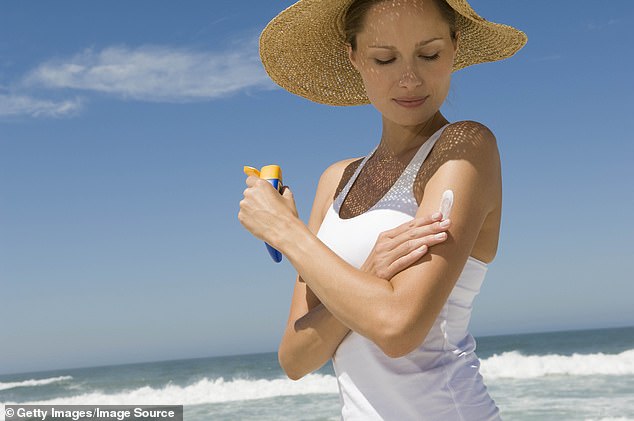Table of Contents
Heading to a warmer climate for a last-minute holiday or taking advantage of the last rays of sunshine in Britain? Keep in mind that your usual creams and cosmetic supplements can interact negatively with sunlight.
“People don’t realise that what they put on their face and body can actually make their skin more sensitive to the sun,” says beauty expert Dr John Quinn of Quinn Clinics.
From age spot creams to supplements that force you to wear sunglasses and perfumes that can cause skin rashes, our experts reveal the six ways your wellness routine may be affecting you…
Some creams can make your skin more sensitive to the sun.
DANGER OF CITRUS ODORS
You might think that applying some essential oil is a perfect way to scent the summer, but natural isn’t always safe. Some essential oils are phototoxic, meaning that if applied to skin that is then exposed to UV rays, they can cause sensitivity leading to redness, rash, and itching.

Dr. Mervyn Patterson
Citrus oils, in particular, contain furanocoumarins, which are compounds present in many cosmetic products.
Although furanocoumarins are useful in treating certain skin disorders, they can cause rashes and even blisters.
Its levels are restricted in certain countries; in 2003 the European Commission stipulated that there cannot be more than 1 mg/kg in tanning lotions.
“Anything with a citrus scent is likely to contain them,” says beauty expert Dr Mervyn Patterson of Woodford Medical.
Cover any areas where you applied them or use them only at night. And always use sunscreen.
WITH AN EYE ON ST. JOHN’S WORT
This popular supplement is a natural antidepressant used to treat anxiety, low mood and PMS. But be careful. “Hypericin and other compounds can increase the skin’s reaction to UV light and make it more sensitive,” says Optegra optometrist Dr Nabila Jones.

Dr. Nabila Jones
It can also affect unprotected eyes. A less frequently discussed side effect is ocular photosensitivity, which can cause discomfort in bright light.
In severe cases, this condition, called photophobia, can potentially contribute to cataracts or macular degeneration.
If you are taking St. John’s Wort, avoid direct sunlight, wear protection such as wraparound sunglasses, and consult a doctor if you experience eye discomfort.
LEAVE THE LASERS
As tempting as it may be to indulge in pre-vacation touch-ups like laser procedures to improve the appearance of your skin, experts recommend saving the heavy lifting until winter.
“We also recommend avoiding laser hair removal on sun-exposed areas,” says Dr. Quinn. “It leaves the skin fragile, which can lead to redness, burning, and increased pigmentation.”
BE CAREFUL WITH THE SUN VITAMIN
Since we need sunlight to create it, there have been some surprising cases of dangerously high levels of vitamin D in the UK. This vitamin has vital benefits for bones and the immune system, but a large percentage of us are deficient (and it is recommended that we all take a supplement in winter). We also get some from our diet, although many of us take a supplement too. The maximum safe level is 100 mcg/4000 IU for adults.

Dr. Oliver Guttman
“Vitamin D is fat-soluble and therefore stored in the body, even if only for a couple of months, meaning it can potentially build up to dangerous levels,” says leading nutritionist Emma Bardwell.
‘Too much vitamin D can lead to calcium buildup (hypercalcemia), which can be harmful to your bones, kidneys, and heart. Complications are rare, but read labels to understand dosages, especially if you take a multivitamin in addition to a separate vitamin D supplement.’
“In its extreme form, hypercalcaemia can affect blood vessels and cause the heart to beat too fast or too slow,” says Dr Oliver Guttman, consultant cardiologist at Wellington Hospital.
The NHS website says you cannot overdose on vitamin D through sun exposure and that whether or not to take a supplement on holiday depends on individual levels.
“Some people need to take supplements year-round, as skin synthesis of vitamin D is not always straightforward, and we can become less efficient at producing vitamin D as we age, but each person’s requirements are unique. The best option is to have your levels tested to see if they are in the right range or not,” says Bardwell.
BE CAREFUL WITH VITAMIN A
All retinoids (or vitamin A) increase cell turnover and are widely used in night creams, but ironically this also makes the skin more vulnerable to developing pigmentation and sunburn.
“New regulations mean that the amount of retinol available in over-the-counter products will be reduced,” says Dr. Patterson. “However, if you do use them, you should make sure to use a sunscreen with a high protection factor and avoid direct sun exposure.”
DISCOVER YOUR LOCALIZED TREATMENT
Benzoyl peroxide, found in many acne and blemish treatments, works by killing bacteria on the skin and should not be mixed with UV rays. “It’s very effective, but it also creates free radicals and can cause redness and premature aging—it’s like going out in the sun without protection,” says Dr. Patterson.
Teenagers are the most likely to use these products and are annoyingly resistant to the idea of covering them up, but Dr. Patterson insists that if you’re using a product containing benzoyl peroxide to treat your pimples, “You should use a high SPF and stay out of direct sunlight as much as possible.”


